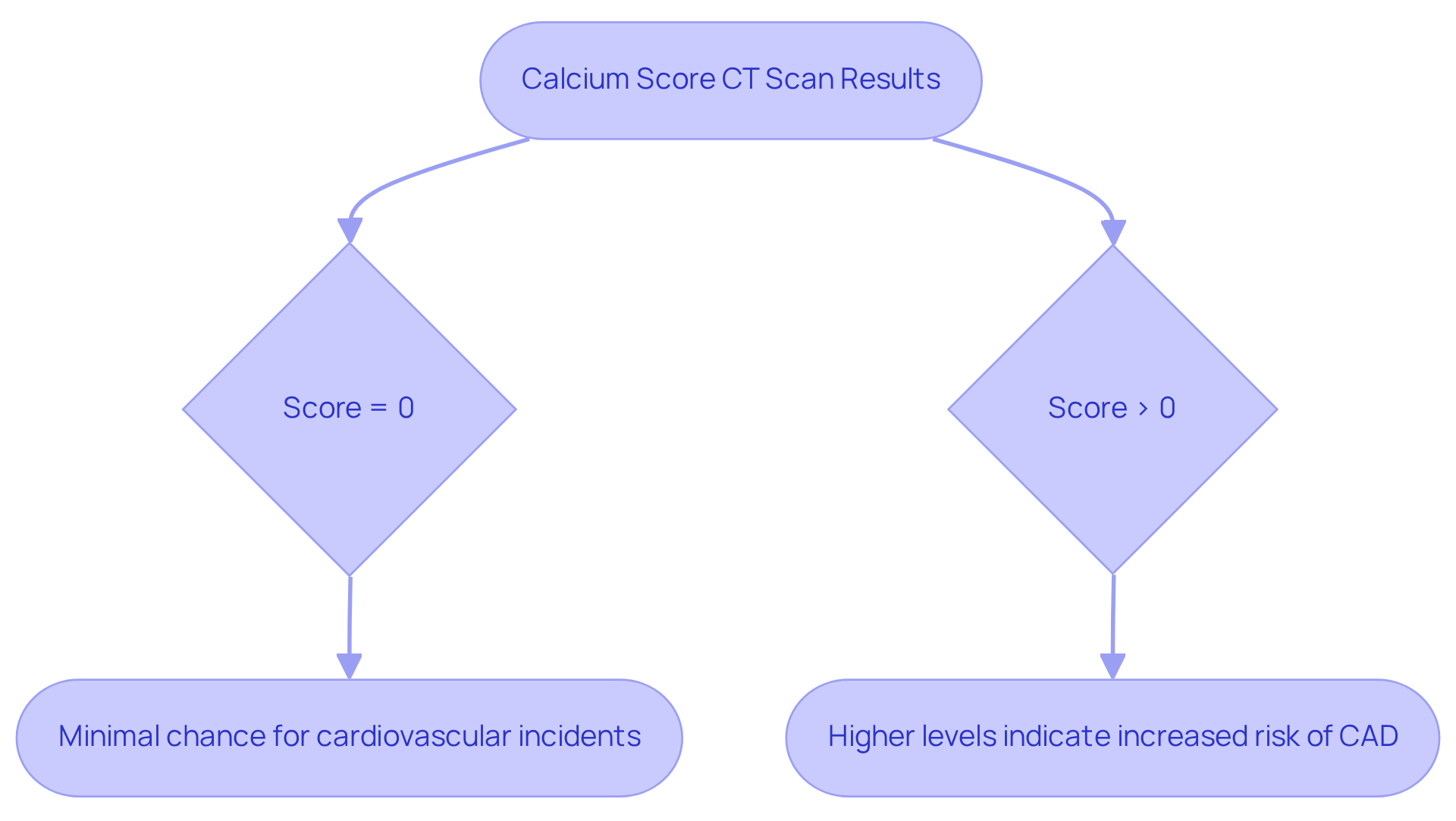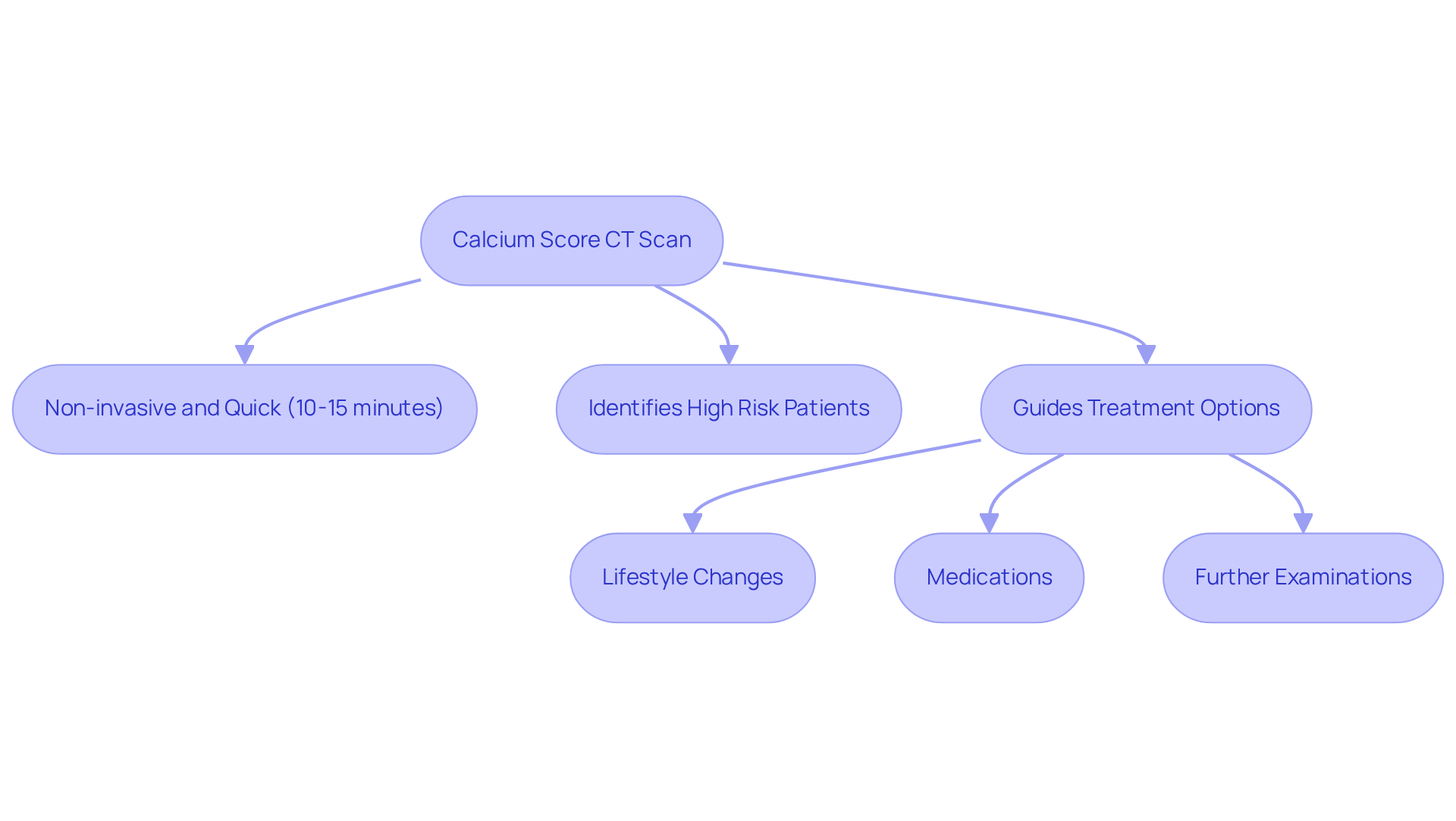


A calcium score CT scan, also known as a coronary plaque scan, is an essential imaging test that detects mineral deposits in the coronary arteries. This test serves as a significant indicator of atherosclerosis and heart disease risk, which can be concerning for many individuals. Understanding your heart health is crucial, and this non-invasive procedure plays a vital role in identifying those at risk for coronary artery disease.
By guiding early intervention and treatment strategies based on the levels of calcification detected, this scan ultimately helps improve cardiovascular health outcomes. It's important to know that you are not alone in this journey; many people share similar concerns about their heart health. Seeking this test can be a proactive step towards understanding your situation and taking charge of your health.
If you or a loved one are feeling anxious about heart health, consider discussing the option of a calcium score CT scan with your healthcare provider. Remember, taking steps towards understanding your health can lead to better outcomes and peace of mind. Your well-being is our priority, and we are here to support you every step of the way.
The calcium score CT scan serves as a vital tool in the early detection of heart disease, revealing hidden risks in the coronary arteries that may otherwise remain unnoticed. By measuring the mineral deposits that indicate atherosclerosis, this non-invasive imaging test empowers individuals to gain a clearer understanding of their cardiovascular health and take proactive steps toward prevention. Yet, with such significant implications for heart health, why do many still overlook this essential assessment? Exploring the nuances of the calcium score CT scan can illuminate its true potential in safeguarding heart health and addressing the critical issue of underutilization in clinical practice.
In addition to this, many patients may feel hesitant or anxious about undergoing such tests. It’s important to recognize these feelings and understand that seeking knowledge about one’s health is a courageous step. Furthermore, by embracing this assessment, individuals can take charge of their health journey, ensuring they are well-informed and prepared. Remember, you are not alone in this; support is available to guide you through the process and help you make informed decisions for your well-being.
A calcium score CT scan, commonly known as a coronary plaque scan, is an important imaging test that utilizes computed tomography (CT) technology to detect mineral deposits in the coronary arteries. These deposits are a significant indicator of atherosclerosis, a condition where plaque builds up and can lead to heart disease. This calcium score CT scan provides a measurement of mineral levels, helping healthcare professionals assess how much calcium is present and determine an individual’s risk of developing coronary artery disease (CAD).
If the reading is zero, it indicates no measurable mineral, suggesting a minimal chance for cardiovascular incidents. On the other hand, higher readings reflect increased levels of calcification and a correspondingly greater risk. Recent studies have shown that the calcium score CT scan and other coronary mineral measurements are valuable indicators of cardiac arrest risk and overall mortality. This highlights their critical role in proactive cardiovascular health management.
If you have concerns about your heart health, understanding these measurements can be a comforting step. Knowing your risk can empower you to take action, and we are here to support you every step of the way. Don't hesitate to reach out for assistance and guidance on your health journey.

The calcium score CT scan is crucial for cardiovascular health, providing a non-invasive method to evaluate the presence of coronary artery disease, particularly in individuals who may not exhibit symptoms. As cardiovascular issues remain a leading cause of illness and death, early detection through this imaging method can lead to timely intervention. This scan is particularly beneficial for individuals at higher risk, such as those with diabetes, hypertension, or a family history of heart disease, as well as those aged 40 to 70 who have contributing factors. By identifying calcified plaque, healthcare providers can better assess risk levels and tailor preventive strategies, potentially reducing the likelihood of heart attacks and strokes.
Consider this: a study revealed that patients with a coronary artery mineral measurement of zero had only a 0.5% chance of experiencing significant adverse cardiovascular events. This statistic underscores the test's importance in identifying low-risk individuals. Furthermore, those with scores between 100 and 400 are classified as having moderate plaque, which encourages proactive management to address their risks.
Despite these proven benefits, experts like Michael Blaha point out that this valuable test is still underutilized. At Amavita Heart and Vascular Health, we integrate advanced imaging technologies, including the mineral assessment CT scan, into comprehensive care plans. This ensures a seamless experience from admission to discharge, enhancing patient outcomes and helping to reduce hospital readmissions.
As the medical community increasingly acknowledges the underutilization of the calcium score CT scan, it becomes clearer how this tool can significantly improve cardiovascular health outcomes. Remember, you are not alone in this journey; we are here to support you every step of the way.

Calcium score CT scans provide valuable insights into coronary artery health, especially for individuals who may feel vulnerable, such as those with diabetes, hypertension, or a family history of heart issues. These scans are quick and non-invasive, typically completed in just 10 to 15 minutes, allowing for a stress-free experience. The results play a crucial role in guiding treatment options, enabling healthcare professionals to recommend lifestyle changes, medications, or further examinations based on the mineral levels observed. Importantly, the calcium score CT scan can identify individuals at high risk for cardiovascular conditions who may have previously gone undiagnosed, paving the way for earlier intervention.
Studies reveal a strong connection between elevated mineral levels and an increased likelihood of heart attacks, underscoring the significance of a calcium score CT scan in preventive cardiology. For instance, a study involving 743 participants found that those with calcium levels between 1 and 399 had a 1.9% chance of experiencing major adverse cardiovascular events. In contrast, individuals with levels of 400 and above faced a significantly higher risk of 6.8%. Additionally, participants in related studies were followed for an average of 3.5 years, enhancing the reliability of these findings. The prognostic value of the calcium score CT scan was further highlighted in a study with 1,749 individuals, reinforcing its importance in clinical practice.
As Dr. Jacob Townsend notes, 'A mineral level measurement is a quick, noninvasive, quantitative assessment of coronary plaque.' Such insights emphasize the importance of mineral assessments in identifying risk and tailoring patient management strategies. At Amavita, we are dedicated to providing comprehensive cardiovascular care and advanced imaging capabilities, ensuring that you feel supported and understood throughout your health journey. If you have concerns about your heart health, we encourage you to reach out—we're here to help you every step of the way.

Preparing for a calcium score CT scan requires several important steps to ensure accurate results, especially for individuals at higher risk, including those with diabetes, hypertension, or a family history of heart problems. It is generally advised that patients avoid eating for four hours before the test, as well as refrain from caffeine and tobacco, which can affect heart rate and image quality. Wearing comfortable clothing without metal fasteners is also recommended to prevent any interference during the scan.
When you arrive, you will lie on a movable table, where electrodes will be gently placed on your chest to monitor your heart's activity throughout the procedure. The CT machine will then take images of your heart, focusing on any calcium deposits in the arteries. This noninvasive process is painless and typically takes about 30 minutes.
Research shows that a CAC value of zero indicates a very low risk of significant cardiovascular events, with only 0.5% of patients experiencing such events during follow-up. This highlights the importance of the scan in evaluating heart health, especially for those seeking comprehensive cardiac assessments at Amavita. After the procedure, results are usually available within a few days, allowing for timely discussions with your healthcare provider about the findings and what they mean for your health.
Healthcare professionals emphasize the crucial role of calcium score CT scans in guiding treatment decisions. For example, Dr. Valentin Fuster mentions that a zero CAC score suggests no need for statins, while scores above 100 indicate a strong recommendation for treatment. This reinforces the importance of shared decision-making between you and your provider, ensuring that treatment plans are tailored to your individual risk profile, especially for those receiving advanced cardiovascular care at Amavita. Remember, you are not alone in this journey; support is always available to help you navigate your health decisions.

Understanding the calcium score CT scan is vital for anyone concerned about heart health. This non-invasive imaging test acts as a crucial tool in detecting coronary artery disease by measuring mineral deposits in the arteries. With this knowledge, you can better grasp your cardiovascular risk and take proactive steps toward maintaining your heart health.
The article highlights the importance of the calcium score CT scan, emphasizing its role in early detection and risk assessment. Consider the connection between calcium scores and the likelihood of adverse cardiovascular events. A score of zero indicates a low risk, while higher scores call for immediate attention and potential lifestyle changes. Furthermore, the underutilization of this important diagnostic tool highlights the need for greater awareness and integration into routine cardiovascular care.
Ultimately, the calcium score CT scan is more than just a diagnostic measure; it represents a pathway to informed health decisions and improved outcomes. You are encouraged to discuss this test with your healthcare provider, especially if you have risk factors for heart disease. Taking charge of your heart health through early detection and intervention can lead to a healthier, more fulfilling life. Remember, you are not alone on this journey—support is available to help you every step of the way.
What is a calcium score CT scan?
A calcium score CT scan, also known as a coronary plaque scan, is an imaging test that uses computed tomography (CT) technology to detect mineral deposits in the coronary arteries, indicating the presence of atherosclerosis.
What does a calcium score indicate?
The calcium score provides a measurement of mineral levels in the coronary arteries. A score of zero indicates no measurable mineral and a minimal chance for cardiovascular incidents, while higher scores reflect increased calcification and a greater risk of coronary artery disease (CAD).
How does the calcium score CT scan relate to heart disease?
The calcium score CT scan is a valuable tool for assessing the risk of heart disease, as higher scores indicate a higher likelihood of atherosclerosis, which can lead to heart disease and other cardiovascular events.
Why is the calcium score CT scan important for cardiovascular health management?
Recent studies have shown that calcium score measurements are important indicators of cardiac arrest risk and overall mortality, making them critical for proactive cardiovascular health management.
What should I do if I have concerns about my heart health?
If you have concerns about your heart health, understanding your calcium score can be a helpful step. It is advisable to reach out for assistance and guidance to help manage your health effectively.